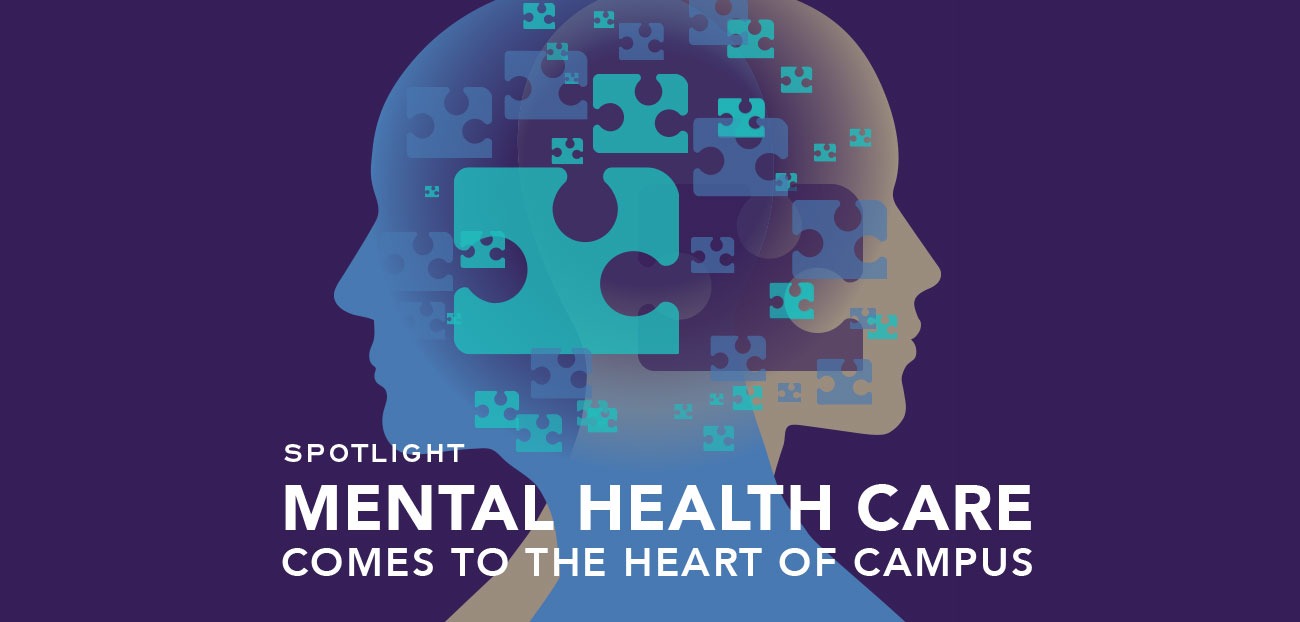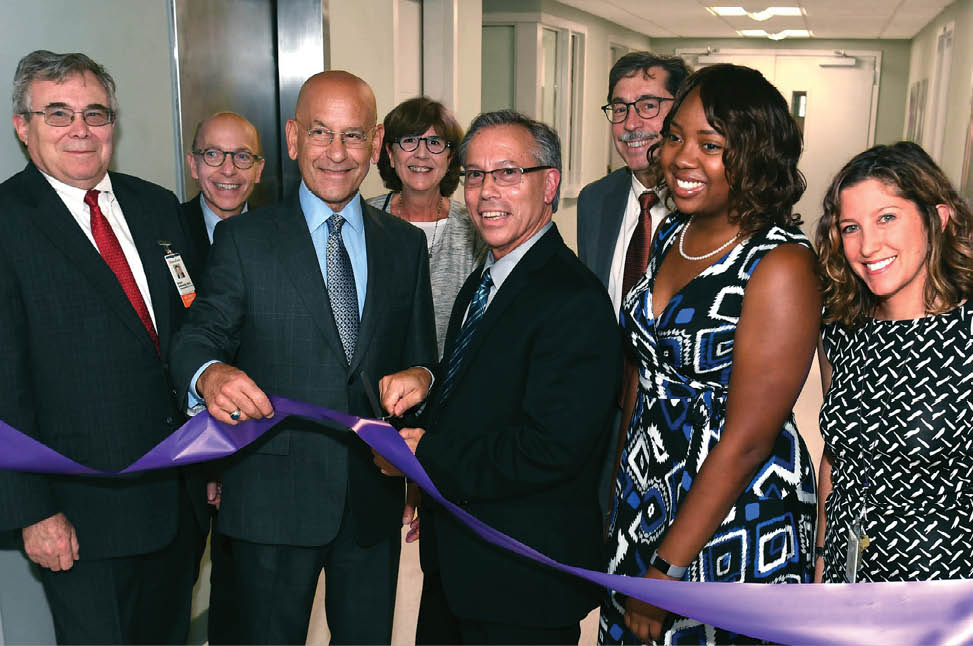
Just getting into medical school is tough enough. Then classes begin—along with the seemingly endless work. All that can take a toll on students’ emotional health.
“Students may think that once they reach medical school, their problems will be behind them, but the statistics show that just isn’t true,” says Joseph Battaglia, M.D., assistant professor of psychiatry and behavioral sciences. Research suggests that at least one of every four students will develop anxiety, depression, or other mental health issues over the course of his or her training—and that few students take steps to manage their mental health.
 The ribbon-cutting ceremony for the new center in September 2018. From left: Bruce Schwartz, M.D.; Jonathan Alpert, M.D., Ph.D.; Montefiore Medicine CEO Steven M. Safyer, M.D.; Mary Kelly, Ph.D.; Joseph Battaglia, M.D.; Dean Gordon Tomaselli, M.D.; Kristin Williams, Class of 2021; and Allison Ludwig, M.D.
The ribbon-cutting ceremony for the new center in September 2018. From left: Bruce Schwartz, M.D.; Jonathan Alpert, M.D., Ph.D.; Montefiore Medicine CEO Steven M. Safyer, M.D.; Mary Kelly, Ph.D.; Joseph Battaglia, M.D.; Dean Gordon Tomaselli, M.D.; Kristin Williams, Class of 2021; and Allison Ludwig, M.D.
To reverse that trend, Einstein has developed a comprehensive mental health and wellness program for medical and graduate students. At the program’s heart is the new Einstein Student Mental Health Center, which opened on the fourth floor of the Van Etten Building last September.
Dr. Battaglia, the new center’s director, wants to break down barriers that have traditionally kept students from seeking mental health care. One of the highest hurdles is lack of time; students get so caught up in caring for others that they have few opportunities to attend to their own health and well-being. “Having a clinic conveniently onsite where you can just drop by means students are more likely to come,” Dr. Battaglia says. “We’ve designed the center with student input to ensure that it’s as easy as possible for them to access care.”
Students get so caught up in caring for others that they have few opportunities to attend to their own health and well-being.
The other major hurdle, Dr. Battaglia says, is the stigma surrounding mental health disorders. “Medical students tend to be stoic and don’t want to reveal anything that could be perceived as a weakness,” he says. But seeking help, he notes, “is actually a sign of strength.”
Einstein Trustee Jay Goldberg agrees. “Opening this center on campus and bringing mental health care into the open is really important,” he says. Mr. Goldberg and his wife, Mary Cirillo-Goldberg, say they were inspired to donate to Einstein by the experience of a family member who has mental illness. They found that mental health research and resources were an overlooked aspect of philanthropy. “We’re overcoming old-fashioned ideas about mental health to get students the support they need,” Mr. Goldberg says.
The new center improves on Einstein’s existing mental health resources in a key respect—by providing clinical services to students.
“Our WellMed student wellness program and the office of academic support and counseling provide a broad range of activities as well as evaluation and guidance,” says Jonathan Alpert, M.D., Ph.D., the Dorothy and Marty Silverman Chair in Psychiatry and chair of the department of psychiatry and behavioral sciences.
“But we can now also offer expert clinical evaluation and treatment for which students previously needed to be referred off campus”—a big hurdle for students working long, irregular hours, he says. Plus, many private mental health providers in the community didn’t take students’ insurance. “We realized we needed a clinical arm that provides services near where students live and study,” Dr. Alpert says.
Medical students tend to be stoic. But seeking help is actually a sign of strength. — Dr. Joseph Battaglia
For convenience, a student can schedule an appointment with a psychiatrist or psychologist by calling the office or using the online calendar. The center takes all types of insurance and has walk-in hours. “If anyone has a concern, we want to make it easy to just stop by,” Dr. Battaglia says. He emphasizes that seeking help won’t hurt students’ professional standing and that all services are confidential.
The vision for the Einstein Student Mental Health Center reflects “the growing awareness that student mental health services are vital,” Dr. Alpert says. “If we are going to graduate healthy, well-rounded future physicians and scientists, we need them to recognize the importance of taking good care of their minds and bodies,” he says.
To make that vision a reality, Einstein and Montefiore are seeking philanthropy to cover the operating expenses of the center and endow it.
Mr. Goldberg and Mrs. Cirillo-Goldberg see their investment in mental health as an investment in the future of healthcare. Medical students who learn how to manage stress and get the necessary support will carry that knowledge into their professional lives, becoming more empathetic healers and better role models for patients. “To put it simply, healthier people provide better healthcare,” Mrs. Cirillo-Goldberg says.